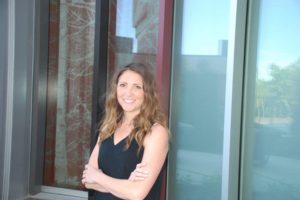Education is the way of life for PhD student and role model Randi Ray

By Laura E. Young
SUDBURY—Education is a theme running through Randi Ray’s life; indeed it seems to have become a way of life for Laurentian University’s Indigenous community outreach and liaison coordinator.
Ray firmly believes education is a key determinant of health for her community. Knowledge gives confidence to be curious and the curiosity, as she says, “will light our inner fires”.
“Lifelong learning keeps us excited, motivated, and sustainable in our personal and professional lives,” adds Ray.
Ray, a member of Flying Post First Nation in Northwestern Ontario, is at a major point in her personal journey in education. She is halfway through her PhD at Nipissing University in education sustainability, focusing on First Nations leadership in education in Northern Ontario.
Through community building and networking, she came to her studies in education.
“I wouldn’t be where I am without my mentors, teachers and community supports that have guided me on my path,” states Ray.
Ray grew up hunting and fishing in the Red Rock lands on the northwestern shores of Lake Superior. She learned to provide for her family and the larger community.
Her father, Murray, is the Chief at Flying Post and her mother, Michelle, is now a librarian in Red Rock, near Thunder Bay.
Ray believes Indigenous traditions are a living, growing and evolving entity. She remains
“[I am a] proud urban Anishninabe-Kwe who doesn’t separate Indigenous and western ways of knowing—it’s just who I am,” states Ray.
She has always had a passion for holistic health
“I feel strongly that in order to be in balance and live mino-bimaadiziwin [the good life], you need to take care of your physical, mental, emotional and spiritual well-being,” notes Ray.
She supports her physical and spiritual sides by playing as many sports she can, especially hockey and baseball. She is a member of the Waabishki Mkwaa (White Bear) Singers. She has a partner, Chris Mercer, and a charming step-daughter, Madison, who according to Ray, is her inspiration every day.
“My community has always referred to me as a ‘bridge walker.’ In my teachings, this means that I am able to walk with a foot in both worlds, not one any stronger, faster or better than the other,” shares Ray.
Role modelling is an interesting term for Ray.
She once told a mentor that she wanted to be just like her.
“No, you don’t,” responded her mentor. “You want to be YOU!’ To me a role model or a mentor is someone who inspires you to be the best version of yourself.”
For Ray, everyone faces times that will test one’s resilience but what helps is having something that gets you back – drumming, going for a nap, hanging with friends, she says.
“The swirling river song teaches us that sometimes there are rapids and life may seem like it’s out of control. We always have to remember that it always goes back to calm when you reach the lake,” she says.
Editor’s Note: What’s in a role model? Who is a role model? Is it a cliché, even a patronizing one or do so-called role model stories become necessary to balance the tide of negative stories? In this ongoing series, Ontario’s Indigenous women reflect on that term role model when they have a moment between their work serving in education, health, justice, and social work.

